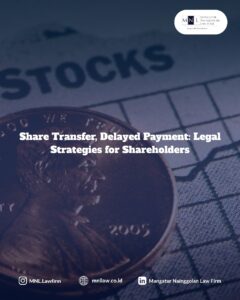
Introduction
In business practice, share transfer is a common activity. This aligns with the provisions of Article 60 paragraph (1) of Law Number 40 of 2007 concerning Limited Liability Companies (UUPT), which explicitly states that shares are movable property that can be transferred. However, in practice, problems often arise when the share transfer process is not accompanied by payment settlement by the share purchaser. This situation causes losses for the share owner because even though the administrative and legal processes have been completed, payment for the share transfer has not been received. This condition can be categorized as breach of contract, as it violates the agreement that has been made. In some cases, the share transfer process has reached formal completion with the issuance of a Deed of General Meeting of Shareholders (GMS) and a Notification of Company Data Change by the Ministry of Law and Human Rights (Kemenkumham).
So, what about shares that have been transferred without payment, even though the legality is perfect?
Understanding the Breach of Contract
When a share transfer has been executed and even formally recorded with the issuance of a GMS Deed and a Notification of Company Data Change by Kemenkumham, but the agreed payment obligation is not fulfilled, such action constitutes a breach of contract as stipulated in Article 1238 of the Civil Code, which states:
“The debtor is declared to be in default by a written order, or by a similar deed, or by virtue of the contract itself, namely if the contract implies that the debtor shall be deemed to be in default upon the expiration of the stipulated time.”
Legal Remedies for Non-Payment
If the share purchaser fails to fulfill their obligations despite having formally acquired shareholder status, the legal step that can be taken by the seller as an effort to protect their rights is to file a breach of contract lawsuit with the competent District Court. This lawsuit may include demands for:
- Obligating the defendant to pay the agreed share price.
- Cancelling the GMS and the Notification of Company Data Change by Kemenkumham.
- Compensating for losses incurred due to the failure of share payment.
Conclusion
Despite the share transfer being legally executed with a GMS Deed and a Notification of Company Data Change by Kemenkumham, the purchaser’s failure to make payment constitutes a breach of contract. This condition provides a strong legal basis for the share seller to file a civil lawsuit in the District Court to demand payment settlement, cancellation of the share transfer, and compensation for the losses incurred by the share seller.
